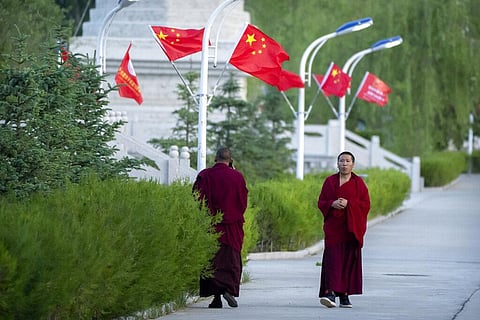

LHASA: Drawing similarities between Taliban and Xi Jinping, Strategic expert Brahma Chellaney said that Chinese authorities demolished a 99-foot statue of Lord Buddha in a Tibetan region of Sichuan in the same manner when the Taliban destroyed the Bamiyan Buddhas.
China is working to annihilate Tibetan religion, culture and identity, as the Chinese authorities have switched Tibetan language schools to Chinese and cut Tibetans off from ancient traditions, Tibet press reported.
Highlighting the recent demolition of Buddha statues in Sichuan province, the author mentions Brahma Chellaney tweet saying, "China is walking in the footsteps of Taliban. Taliban has destroyed numerous religious artefacts in Afghanistan during their first reign before the U.S invasion where their most notable targets were two massive Buddha statues built in the sixth century. Chellaney said China was on its way to wipe off the Tibetan culture and was following the footsteps of the Taliban."
In 2001 the Taliban rulers of Afghanistan had demolished two historic and giant 15th-century statues of Lord Buddha in Bamiyan that invited shock and condemnation from across the world.
Authorities in China's Sichuan province last month forced Tibetan monks and other local residents to watch the demolition of a large and venerated Buddha statue following official complaints that the statue had been built too high, the Central Tibetan Administration reported citing Tibetan sources on January 5.
Radio Free Asia (RFA) verified the destruction of the statue by analysis of commercial satellite imagery, the Tibet Press reported.
It further reported that the Chinese authorities forced monks from Thoesam Gatsel monastery and Tibetans living in Chuwar and other nearby towns to witness the demolition, which started on December 12 and continued for the next nine days.
Based on rights organizations, the statue was initially formed with the complete agreement of the local authorities for Buddhist acceptance that it would avoid starvation, war, and possible disasters of fire, water, earth, and air with the financial support of local Tibetans in Drago County, Kham Tibet, the Tibet Press reported.
However, at the time of dismantling, local Chinese authorities declared that the construction documents are fraudulent and stated that the statue's height was not permitted in the area.
The local residents and monks who were forced to witness the demolition have said that they had all the legal documents for the construction of the giant Buddha statue and that the Chinese authorities demolished it six years after it was built, the Tibet Press reported.
The US state department has said that it has profound concerns for the Tibetans and has requested China authorities to respect the human rights of Tibetans. It says it stands for the safeguarding of Tibet's environment as well as the exclusive cultural, linguistic, and religious identity of Tibetan traditions.